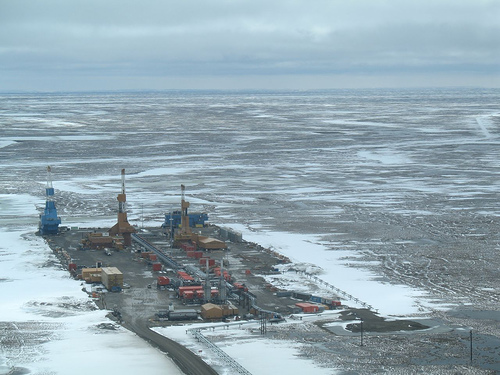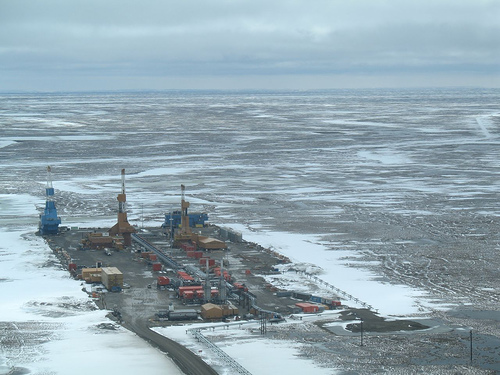 Oil drilling in Alaskan wilderness is bad enough, but an accident off Alaskan shores could be disastrous. Photo: mecocrusIn case you didn’t hear it the first hundred times, Royal Dutch Shell has a message for all of us: “We’re not BP.” Its engineers made the case once again at the presidential commission hearings on the Gulf spill this week and its marketing team is doing its part with an ad campaign that also rolled out this week.
Oil drilling in Alaskan wilderness is bad enough, but an accident off Alaskan shores could be disastrous. Photo: mecocrusIn case you didn’t hear it the first hundred times, Royal Dutch Shell has a message for all of us: “We’re not BP.” Its engineers made the case once again at the presidential commission hearings on the Gulf spill this week and its marketing team is doing its part with an ad campaign that also rolled out this week.
Bottom line is that Shell, which has already spent more than $3 billion for offshore leases, is desperate to begin drilling off the north coast of Alaska next year and it wants everyone to know that it’s way more prepared to handle problems than BP ever was.
Not so fast.
Don’t go there: The Pew Environment Group has released a report [PDF] pointing out that trying to clean up an underwater offshore spill in the extreme conditions of the Arctic would be way beyond anything the oil industry has ever faced. In addition to the remoteness of the drilling areas — the nearest major port would be 1,300 miles away — response teams would have to deal with gale-force winds, long stretches of darkness, bitter cold, ice floes, and nasty seas.
Not to mention that ice floes could carry oil hundreds of miles away from the source and if it freezes, crude could linger in the environment for decades. Says Pew researcher Marilyn Heiman:
There is a lot of pressure by Shell to drill next summer. But the oil companies are just not prepared for the Arctic. The spill plans are thoroughly inadequate. [Guardian]
Slick happens: Leave it to Tony Hayward, BP’s infamous ex-CEO, to unwittingly reinforce Pew’s point. Speaking to students at Cambridge University recently, he confessed:
For me perhaps the most shattering reflection was just how much havoc can be wreaked by a single accident in one small part of a giant company’s operations — an accident moreover that all our corporate deliberations had told us simply could not happen. For BP this was the ultimate low-probability, high-impact event — a black swan to borrow a term used in the financial crisis. [Guardian]
And in other green news:
The Bible told him so: Rep. John Shimkus (R-Ill.), one of the candidates to chair the influential House Energy and Commerce Committee, reiterated that he’s not worried about flooding from global warming because the Bible says God promised He wouldn’t do that. Here’s his latest comments from an interview with Politico.
I do believe in the Bible as the final word of God. And I do believe that God said the Earth would not be destroyed by a flood. Now, do I believe in climate change? In my trip to Greenland, the answer is yes. The climate is changing. The question is more about the costs and benefits and trying to spend taxpayer dollars on something that you cannot stop versus the changes that have been occurring forever. That’s the real debate.
Growth hurt: China’s economy is growing so fast that it will be huge factor in driving up oil prices and carbon dioxide emissions over the next 25 years. So says the International Energy Agency. [The New York Times]
Not so smart: The U.S. has already lost its standing as world leader in cleantech. Now it may fall behind China in smart grid technology. [GreenBiz]
Security alert: Scientists around the world are starting to take geoengineering much more seriously. But they also worry that it can create a false sense of security about controlling climate change. [Guardian]
That blows: Here’s today’s irony: Climate change will likely be bad for wind power because as polar areas warm up, the wind dies down. [Discovery News]
Pick your poison: Environmental chemists warn that global warming could increase the toxicity of pesticides, heavy metals, and household chemicals. [NatureNews]
Greening up its act: Diesel, once derided as too dirty, could actually help reduce energy consumption, thanks to the invention of a fist-sized fuel cell. [Discovery News]
Better to be good than thin: No more supermodel jokes the rest of the week. A group of them are helping to raise money to build solar-powered hospitals in remote locations. [GOOD]



